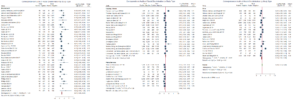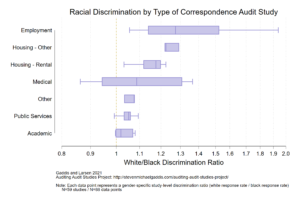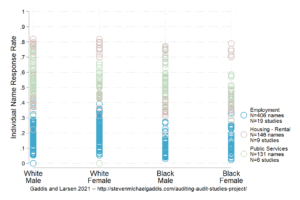Auditing Audit Studies Project
The Auditing Audit Studies Team investigates the scholarly knowledge of racial/ethnic discrimination based on correspondence audit studies.
Edvard Nergård Larsen, Postdoctoral Fellow in Sociology and Human Geography, University of Oslo
Charles Crabtree, Assistant Professor of Government, Dartmouth College
John B. Holbein, Assistant Professor of Public Policy, University of Virginia
Last updated December 1, 2021
Part 1: Heterogeneity in Correspondence Audits of Racial Discrimination: A Meta-Analysis
To what extent does racial/ethnic discrimination in America differ across contexts? In this paper, we provide the largest and most comprehensive review of racial/ethnic discrimination research to date. We conducted a meta-analysis of 78 correspondence audits in the United States, representing over half a million applications, emails, and other forms of correspondence that occur in all aspects of modern society, including the hiring, housing, medical, public services, and education sectors. We find that racial/ethnic discrimination in the United States continues to be a large problem, but discrimination against racial/ethnic minorities simultaneously exhibits a substantial amount of contextual heterogeneity not recognized in previous discrimination research. Discrimination against Black Americans is most common in hiring, followed by the rental housing context. Discrimination against Hispanic Americans is highest in hiring, but discrimination in other contexts is considerably lower. Although discrimination occurs in education, medical, and public services contexts, it is far less common in these sectors.
Figure 1. Forest Plot of Correspondence Audits Examining Discrimination Against Blacks by Type of Study
Figure 2. Box Plot of White/Black Discrimination Ratio by Type of Correspondence Audit Study
Part 2: The Effects of Name Perception and Selection on Social Science Measurement of Racial Discrimination
Do race and class perceptions of names influence the outcomes found in correspondence audit studies. In other words, is our understanding of racial discrimination biased by the names we choose in correspondence audit studies?



